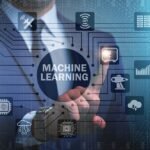AI in Finance: The use of AI algorithms for fraud detection, risk assessment, trading, and portfolio management in the financial sector.
Fraud Detection: AI algorithms can analyze vast amounts of financial data in real-time to identify patterns and anomalies that may indicate fraudulent activities. Machine learning models can learn from historical data and continuously adapt to evolving fraud patterns, improving fraud detection and minimizing false positives. Risk Assessment: AI enables more accurate and efficient risk assessment in finance. Machine learning algorithms can analyze historical data, market trends, and economic indicators to assess credit risk, market risk, and operational risk.
AI models can provide risk scores and predictions, helping financial institutions make informed decisions and manage risk exposure. Trading and Investment: AI algorithms are used in algorithmic trading, where they analyze market data, identify patterns, and execute trades automatically. Machine learning models can learn from historical trading data and make predictions about market trends, price movements, and investment opportunities. AI-powered trading systems can also incorporate sentiment analysis from news and social media to make more informed trading decisions.
Portfolio Management: AI techniques are employed in portfolio management to optimize asset allocation and risk management. Machine learning models can analyze historical performance, economic indicators, and market data to generate optimal investment strategies. AI-powered portfolio management systems can provide personalized recommendations based on individual risk profiles, financial goals, and market conditions.
Customer Service and Chatbots: AI-powered virtual assistants and chatbots are used in financial institutions to provide customer support, answer queries, and assist with basic transactions. Natural Language Processing (NLP) algorithms enable these systems to understand and respond to customer inquiries, improving the customer experience and reducing operational costs. Credit Scoring: AI algorithms can analyze various data sources, including credit history, alternative data, and behavioral patterns, to assess creditworthiness.
Machine learning models can predict default risk, evaluate loan applications, and provide more accurate credit scores, enabling faster and more objective lending decisions. Regulatory Compliance: AI technologies help financial institutions comply with complex regulations. Machine learning algorithms can analyze large volumes of data to identify potential compliance issues, monitor transactions for suspicious activities, and generate reports required by regulatory bodies.
AI can streamline compliance processes, reduce manual effort, and enhance accuracy. It’s important to note that while AI offers numerous benefits in the financial sector, there are also challenges and considerations, such as data privacy, bias in algorithms, and the need for human oversight. Responsible and ethical use of AI in finance is crucial to ensure fair and transparent outcomes.


































